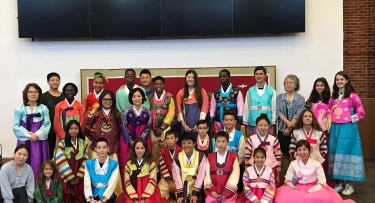Mercy’s Summer Korean Language and Culture Program is a Hit

STARTALK, the Korean language and culture summer program at Mercy College, just wrapped up its second year. Held over three weeks during the summer, 26 middle-schoolers from diverse language and cultural backgrounds engaged in a program of learning about and experiencing Korean language, art, music and dance.
Co-directed by Drs. Mi-Hyun Chung and JungKang Miller, faculty members in the School of Education, STARTALK provides language practice, cultural connections and perspectives on traditional practices in Korea and America. The full-day program is offered free for up to 30 students with limited knowledge of, yet strong interest in, Korean culture and language.
Why offer a Korean cultural program for middle-schoolers, some of whom may have no connection or prior exposure to that country’s language or customs?
According to One World Now, a Seattle-based international educational program, Korean enrollment at four-year colleges nationwide increased more than 45 percent between 2011 and 2013. Currently, Korean is spoken by more than 70 million people worldwide.
Closer to home, word about Mercy’s STARTALK program has spread. “Parents see it as an opportunity for their children to learn a foreign language over the summer — something they will need for college applications and for life in a more globally-focused world,” said Miller.
“Foreign language programs at the middle- and high school level are generally not well-funded,” said Chung. “We provide an integrative focus on what we call the five Cs — Communication, Culture, Connections, Comparisons and Communities — that facilitates development of Korean language skills and understanding of Korean culture through student research and hands-on activities in Korean arts and crafts.”
While most participants have one or both parents who are second or third generation Korean, a fair number had no prior association. “Some came because they have friends who are Korean,” said Miller. One student began learning Korean on her own, and commuted from Manhattan to Mercy for the program. Still others, fascinated by the current musical trend from Korea known as K-pop, came to find out more about their idols’ home country.
“In our program we focus on both traditional and modern Korean cultural influences, and K-pop certainly fits in with that,” said Chung. “A positive association with a culture through any form, be it food, music or language, makes people more receptive. K-pop captured their attention, and now they want to learn more about Korea’s centuries-old traditions.”
